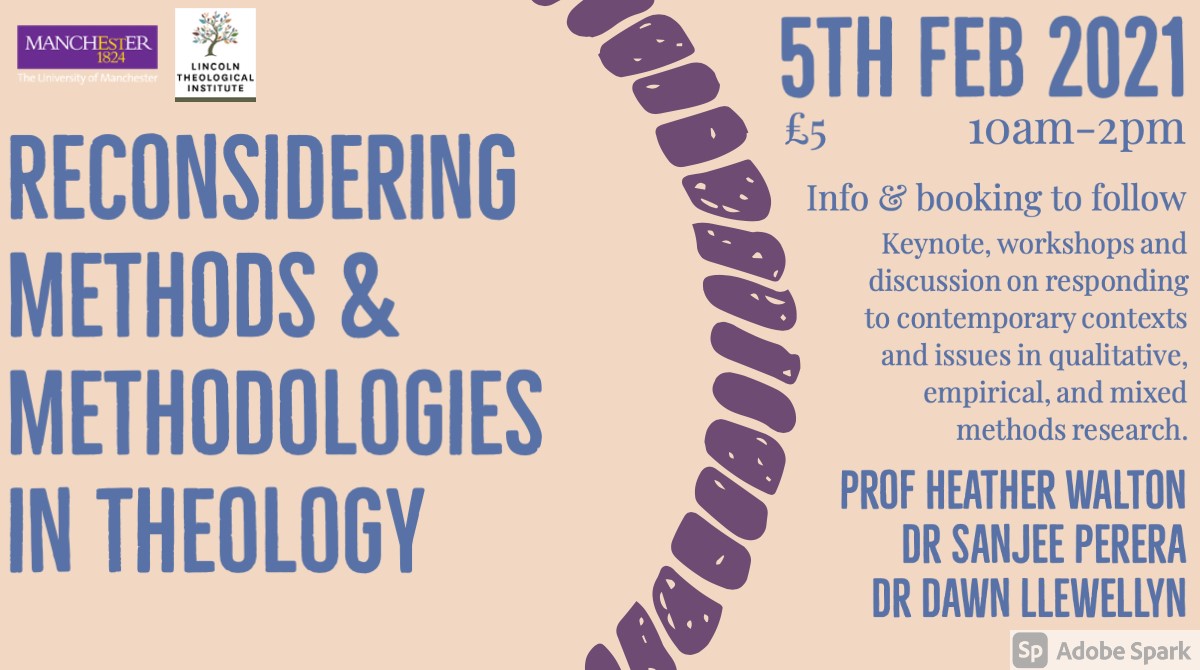Reconsidering Methods and Methodologies in Theology
In hosting this event, LTI aimed to provide space for a discussion of how we might reframe our engagement with methods and methodologies. What challenges are emerging from our methodological practices? Where might we move beyond the boundaries and divides, whether between different disciplinary approaches, or in separating out the social, the political, and theological, or even the sacred and the everyday? The event saw our three speakers engage with critical discussions of relationality and power in research, thinking about the relationships between arts, social sciences, psychology, and theology, as well as the relationships between researchers and participants.
Professor Heather Walton gave the keynote address on ‘Making Meaning: Being Spiritual in Social Research’. In introducing us to different ways of thinking about the development of social research methods in theology, Professor Walton encouraged us to think about how the relationship between theology and the research tools from different disciplines have been framed. In taking up research tools from other disciplines in theology, she noted that theologians might not always have attended to the ‘health and safety warnings’ that come with the tools – the ethical discussions that have been taking place in other disciplines for a number of decades around methods and methodologies. Professor Walton then explored a number of key images arising from different theories of relational ontology, noting how these theories provide images that represent a shift in the cultural imaginary. In exploring these images, Professor Walton noted how they can resource ways of thinking about relationality in research, particularly in eschewing ‘divisive’ thinking about borders and binaries and embracing interdisciplinary modes to create new forms of research. We might frame this as collaboration, rather than as a borrowing or giving of methods and ideas from other disciplines, which might enable us to face wider social challenges together. Finally, Professor Walton spoke about her own work in developing the theology through creative practice research programme at The University of Glasgow.
We then heard from Dr Dawn Llewellyn on ‘What’s Next for Feminist Methodologies: Power and Relationality in Religion and Gender’. Dr Llewellyn spoke about recognising the complex and problematic inheritance of working with feminist approaches, acknowledging that there is much that mainstream feminist approaches have overlooked or failed to interrogate, but also not wanting to entirely abandon feminist methodologies. In examining power and reflexivity, Dr Llewellyn acknowledged some of the shortcomings of reflexivity, but suggested that it also offers much in encouraging researchers to think about how their positionings influence the design and practice of research methods. In exploring this, Dr Llewellyn offered examples from her own research, including where her thinking had changed about how to engage in reflexivity. Dr Llewellyn examined where intersectionality and postcolonial challenges raise questions of how white feminist methodologies can construct singular subject positions, rather than recognising the complex material heterogeneity of women’s lives.
Finally, we heard from Dr Sanjee Perera on ‘Liminal Methodology and Interdisciplinary Research’. Dr Perera spoke about her training as a psychologist, and her work on the Minority Anglicanism Project. She provided five groundrules for engaging with interdisciplinary research between the sciences and theology, in particular for thinking about ways of respecting their differences and what conversations between different disciplines can bring to a project. This raised key questions about making decisions about adopting new methods – whether these can be learnt oneself, learnt from others, or whether collaboration with others who have a particular expertise is required.
________

LTI is hosting a workshop event on Reconsidering Methods and Methodologies in Theology the 5th February 2021. The day will provide space for considering how to respond to current challenges and possibilities in theological research.
The workshop is open to all who are interested in the current contexts and issues in qualitative, empirical, and mixed methods research – postgraduate students and well-established researchers are all welcome!
Timetable:
10.00: Welcome
10.10: Professor Heather Walton: Making Meaning: Being Spiritual in Social Research
11.10: Break
11.25: Dr Dawn Llewellyn: What’s next for Feminist Methodologies: Power and Relationality in Religion and Gender
12:10: Breakout discussion groups (optional)
12:40 Break
1:00 Dr Sanjee Perera: Liminal Methodology and Interdisciplinary Research
1:45 Closing Reflections
2:00 Finish
With each of the speakers, there will be a time for Q&A.
The input from speakers will be recorded and will be made available to participants after the event.
Registration:
Registration for the conference is through the University of Manchester e-store.
You will be asked to create an account for the University of Manchester e-store.
You will also be asked whether you want to participate in the breakout discussion groups, and whether you require closed captions for the breakout groups. Live closed captioning will be provided for all of the other sessions.
Zoom links will be sent closer to the event.
If you have any questions, please contact clare.radford@manchester.ac.uk